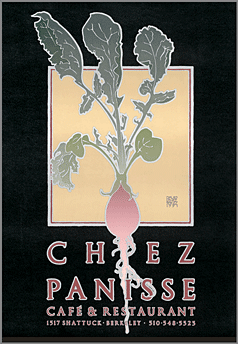
Click on image for detail
(#174) CHEZ
PANISSE 26th ANNIVERSARY (RADISH)
Chez
Panisse Home Page:
Edition of 1732 of which 125 copies are signed 1-125, 26 copies are signed A-Z as artist's proofs; 2 are signed as dedication copies, and three sets are signed as progressives.
July 30, 1997 16-3/4" x 24" 8 colors
Client: Chez Panisse Restaurant, 1517 Shattuck Avenue, Berkeley CA 94709. Telephone (510) 548-5525
Dedication copies: Alice Louise Waters, Patricia Curtan 1-125: Galerie Louvre A-Z: Artist's own use Progressives: One set to Alice Waters, two sets to Galerie Louvre.
(How magazine's 1998 Design Annual; Society of Illustrators 41st Annual Exhibition. Color Catalog)
Not content with what came naturally, Neolithic farmers made ten ears of grain grow where one had grown before, and whatever didn't grow in sufficient abundance they altered until it did. These new men drove the smattering of native hunter-gatherers before them as chaff before a strong wind, and drew behind them in their relentless expansion sparkling trails, the ancient trade routes upon which vital salt and god-pleasing incense trafficked inland, while gold, ivory and slaves trickled back toward the seas from which the salt had come.
The aboriginal hunter needed neither oil nor salt, since both were amply provided in his ordinary fare. The farmer, far inland and eating little meat, found himself in desperate need of both.
Long before discovery of miraculous olives, Egyptians domesticated the oil-seed radish. Varieties cultivated by the Greeks and Romans for keeping over the scarce times of winter were hefty black-skinned roots, cooked like turnips or served raw as a salad, seasoned with honey, vinegar and salt. Our blush-red radish originated as a weedy pot-herb, harvested in the wild by peasant foragers. Transformed by ingenious 18th century gardener-magicians into a tiny heart-shaped relish, crisp and plump, it provides no substantial nourishment, but gives pleasure for pleasure's sake.
Begin a meal with salt and radishes, and reflect: almost nothing that we eat, drink or wear existed in the world of our ancestors.